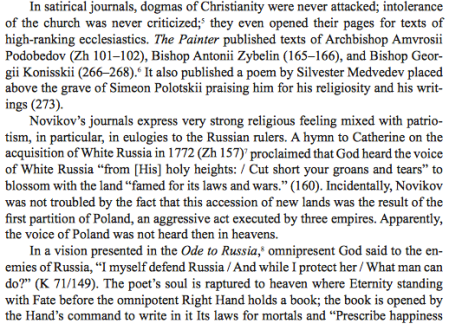Freemason, Nikolay Ivanovich Novikov was Director of Moscow University Press beginning in 1779. His extraordinary output of Masonic journals and books was supported by masonic lodges, the Russian Orthodox heirarchy and Russian monarchy. Russian Orthodox Archbishop Platon wished that, “in the entire world there would be such Christians as Novikov.”
From, Novikov: From Masonry to Orthodoxy, by Adam Drozdek


June 12, 2017 at 1:35 am |
Hello: I've been looking for the work u mention, this blog article, and I find on Amazon there is indeed an Adam Drozdek, author, listed, but I find no listing for the work entitled, “From masonry to orthodoxy,” though there are some titles listed for this Drozdek on theology and Greek philosophy–is this title, “FM masonry to orthodoxy,” perhaps a chapter heading? Thanks for ur help. A.
June 12, 2017 at 2:24 am |
It's quite well known that Peter the Great visited England and Holland in 1698, invited by William III, to learn about the art of ship building. (“To gain practical experience in the largest shipyard in the world, belonging to the Dutch East India Company, for a period of four months.”)
https://en.wikipedia.org/wiki/Peter_the_Great#Grand_Embassy
https://en.wikipedia.org/wiki/Grand_Embassy_of_Peter_the_Great
Supposedly he was initiated into Freemasonry in London by Christopher Wren and after he returned to Russia he allowed Franz Lefort and his Scottish officers to establish a lodge. Peter the Great was associated with a few Scots from early on: Patrick Gordon (“helped to decide the events in favor of Peter in 1689”), Robert Bruce (“first chief commander of Saint Petersburg”) an his brother Jacob Bruce (quotes from Wikipedia.)
While in 1714 Peter brought one Jan Acosta from Amsterdam into his court. He was likely related to the Da Costa family which name can be found mentioned in quite a few places. Mentioning this because a Da Costa is mentioned in a quote in your previous post. Another Da Costa was Moses Da Costa who is noted to having petitioned for admission into the English “Russia Company” in 1727.
https://en.wikipedia.org/wiki/Moses_da_Costa
(Of course I don't know to what degree were the Da Costas in different countries really related.)
June 12, 2017 at 5:32 am |
Dear apsterian, its an academic paper
http://dlibra.umcs.lublin.pl/Content/21581/czas17868_32_2014_8.pdf
June 12, 2017 at 5:38 am |
Dear anonymous June 11, 2017 at 10:24 PM, thank you for that data. Centuries earlier, Tsar Ivan iV invited Elizabethan occultists, including John Dee to his court and in 1555 established international trade relations with the British joint stock “Muscovy Company” which was a model for the later infamous East India Company. Tsar Ivan IV reportedly proposed marriage to Elizabeth I. Whatever the case, their correspondence is a matter of record.
June 12, 2017 at 5:43 am |
Also, In,1700: Tsar Peter the Great appointed the apocalyptic Kabbalist Stefan Iavorskii as most powerful cleric in the Russian Orthodox Church
https://books.google.com/books?id=3nKoFMo3ECoC&lpg=PA232&ots=BYlQdL5B8I&dq=stefan%20iavorskii%20cabbala&pg=PA211#v=onepage&q&f=false
June 15, 2017 at 1:09 am |
Tsar Feodor Ivanovich (or Boris Godunov?) invited John Dee to enter service in his court in 1586. And John Dee is described as mathematical advisor for the Muscovy company in the following article:
https://extra.shu.ac.uk/emls/04-2/kochruli.htm
But John Dee's son Arthur Dee was actually court physician to Tsar Mikhail Romanov for almost 14 years, arranged by James I and at the request of the Tsar in 1621.
https://en.wikipedia.org/wiki/Arthur_Dee